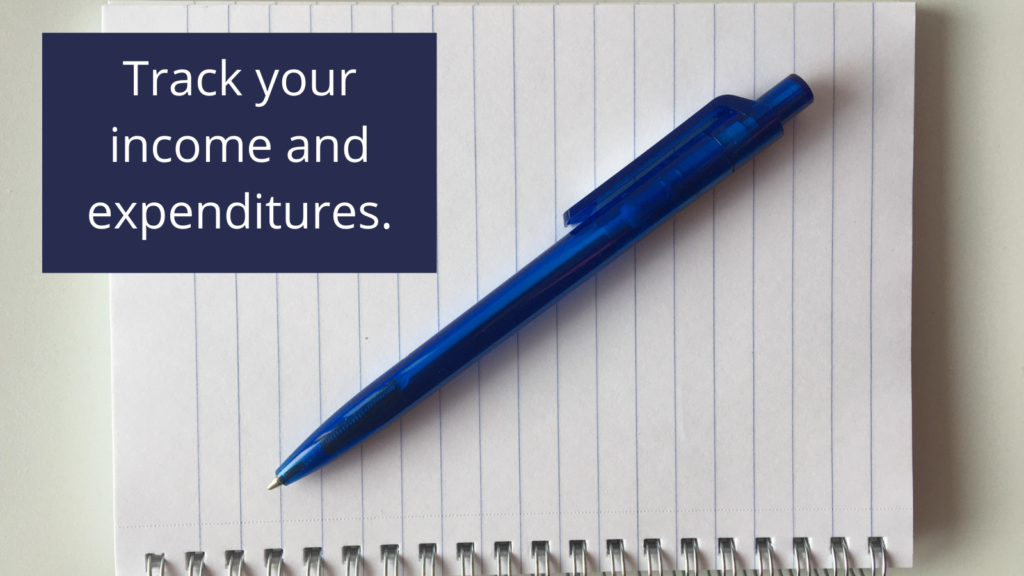How To Save Money Fast
Have you ever needed to save up some money fast? Has your mechanic said your car will soon need some work—and it’s not going to be cheap? Maybe you’re coming out of a crisis that drained your emergency fund and need to replenish it. (You know there will be a next time…) Maybe it’s the beginning of a new year, and you haven’t set aside enough money to cover the deductible for your health insurance, but your family already has plenty of doctor appointments lined up. The need to save money fast could be any number of things. Whatever the reason, you’ve realized you need to save some money quickly.
Saving money fast requires a review and responsible adjustment of spending and saving habits. A budget and spending journal are handy tools. Determination and flexibility are imperative in various ways to accumulate funds. These and perseverance through the contradictory perception (and the pressure that comes with it) of the time allotted to reach the goal, both dragging and flying by enhancing success. A plan, a goal, and action are required.
Mindset
Saving money fast is an exercise in discipline that has a great upside: You’ll get a huge sense of reward after you’ve accumulated the funds to meet the underlying demand. That means you need a mindset that will get you through the tough time.
The Mindset
Assign your project the urgency and determination it deserves. I’ll follow that with a word of caution: Don’t get into a funk over the need to change or cut back on some of your spending habits. Nobody really enjoys the proverbial “tightening of the belt.” You’ll adopt somewhat stricter criteria for your finances and lifestyle, but it will be temporary. Soon (because this is about accumulating funds quickly), you’ll be done. You should know these circumstances allow you to excel.
I’m sure you’ve already recognized the first thing required to make this project a success: Know your why. What exactly are you saving for?
Know your why
Why do you need to save this money? And why so fast? The why is your driving force. Your why could be I need $1,000 for an emergency fund. Or let’s use it for that annual health insurance deductible: In 2020, the average deductible for a family (family size not taken into consideration) was around $8,500. If you were aware of this by the end of 2020 and you’d saved $7,000 towards the new deductible, you might feel like you were in a good place financially to face 2021. If you knew you were looking at many medical issues going into 2021, you’d probably want to set aside the remaining $1,500 ASAP. The need to accumulate enough money to fully cover your deductible is your why, and the $1,500 is your savings goal.
Set a savings goal
Monetary and timeline goals are both important. They’re your targets.
Hold onto the idea of deducting the remaining $1,500 for your health insurance as your financial goal. You’ve already determined you need it fast. So, what does “fast” look like? It can be relative but given your very real need to have this money soon, not to mention you’ll soon need to start saving towards the deductible for next year (2022), I’d say a maximum of three months would be optimal. When you think of saving money fast, your goal should never be more than six months. And yes, I’ll concede that six months, or even three, can seem like a long time at the starting point, but as I indicated earlier, at the end you’ll understand what the words such as “soon,” “fast,,” and “quick” mean.
Once you have your start and finish dates, you’ll want to set a schedule (a timeline) for saving. A weekly or per-pay period works well. Divide your saving goal by the number of times you plan to make deposits towards the amount needed. In this case, your timeline is three months, and you’re planning to make weekly deposits. Your financial goal is to save $1,500 throughout that time. In general, there are 13 weekly paydays in 3 months.
$1,500/13 is a little over $115 a week
That gives you 13 mini goals of $115, which will leave you minimally short by the end of the three months… You’ll be close enough to call it done. (You’ll have to come up with about $5 more to make it exact.)
Monitor your mini goals by charting them. (I use a calendar.) I’d indicate each of the scheduled days I needed to deposit the $115. It would go into the account I use to pay my bills. Note 1: This account holds funds for most of my bills, so I keep a spreadsheet with running totals of how much money in the account is designated for each objective. Note 2: If you find extra money, there’s no reason you can’t deposit it to speed up the saving process. Just keep track of it on the spreadsheet. It’s part of your bigger money management picture.
Manage your money better and save money faster
Most people don’t give it much thought, but you need to have a plan for your money. That plan is called a budget. A budget expresses both your short- and long-term financial objectives and the monetary goals for attaining them. The spreadsheet I talked about above gives you a means by which to measure your progress. If you don’t have a budget, make one. I wrote an article How to Make a Budget. It gives you the nuts and bolts of how to make a workable budget.
Managing your money is next to impossible if you don’t have a budget. As you read the article, I just mentioned, you’ll realize it’s also impossible to make a budget if you have no idea of how much money you need (vs. use) on your objectives. That’s where a spending journal comes in.
Spending journal
Your budget represents the decisions you make about funding for recurring or anticipated needs and wants. Unfortunately, too many of us are at least somewhat clueless about the what? the when? the how much? and how to finance? aspects of our spending. Instead, we respond as those needs and wants to present themselves. And often, we come up short of money. A spending journal is an easy way to keep track of your spending. You note the where and how much each time you spend money (cash, debit, or credit card) as you go. Those figures can be used to track legitimate expenditures and waste—information invaluable when you make or reevaluate a budget, especially when you need to save money fast.
For more information on spending journals, read my article “ Why Do I Need a Spending Journal”?
Budgets
If the need to save money fast is the driving reason behind developing a budget right now, be aware that you’ll want to revise it after you’ve met your immediate goal. Currently, your budget may need to be somewhat austere. You’ll have more latitude for spending at the end of this period. (Remember, we’re using three months to save up to $1,500, for example.)
If you already have a budget, do an analysis. Most budgets have at least a little fat that can be cut; some categories may receive funding that can be suspended or even eliminated. Your spending journal can help you make those decisions. And remember, budgets are not static. I’m sure you’ll want to make some revisions after this short, intense period of saving is over. With that in mind, you should reevaluate your bills and shopping habits with consideration to the current need for saving quickly as well as for more effective use of your money shortly.
Reevaluate your bills
So many bills are on autopilot: Years ago, you budgeted for something at what would be the maximum required payment. Since then, that amount has been part of regular deposits made to the account from which you pay your bills. For convenience, you arranged for it to go out on a schedule through autopay. And you’re happy because you’ve never received any communication from your bank or the payee about nonsufficient funds. Is that product or service still a necessity or factor in the quality of your life?
Review your bills and payouts. If a product or service is no longer relevant, discontinue it. Stop wasting that money. If it’s still needed or pertinent, consider scaling down. I’ll give you some examples:
- Magazine subscriptions—Most of us don’t have the time to read the magazines we subscribe to. Sometimes, not even the ones we pick up at the store. Cancel subscriptions for long-term savings. And to add to the money you need to quickly accumulate, instead of buying, borrow issues you’re interested in from the library; put your savings towards the total you need fast.
- Gym membership—When was the last time you went to the gym? Are you getting what you’re paying for in terms of results? If not, drop your membership and put that money towards your savings goal. (Once you’ve saved the money you need fast, you can decide if you want to give the gym another try.)
- Cable packages—Many people find they can get what they want less expensively using alternative venues. Think Netflix, Hulu, Amazon Prime, and others. Applied to the cause, the savings would help you reach your goal more quickly. If dropping cable doesn’t give you extra money fast enough to impact your fast savings project, the difference in cost could help you ease other goals. (And circumvent another urgent savings project.)
- Car insurance—If you drive, you need car insurance. But do you need the level of coverage you presently carry? Talk to your agent about alternatives. Maybe you can raise your deductible to reduce the premium. Or you can shop for a carrier with a better deal on car insurance. Mine decreased by 50% when I changed insurance companies; the new company offers huge savings if you pay for six months at a time. If you can reap an immediate financial benefit from such a change, put it towards your current cause (in this case, the $1,500 you need to have your total for medical insurance deductible). Note: If the change won’t go into effect in time to help you immediately, it can still give you a long-term benefit.
I’ve given you several suggestions that will help you accumulate funds by cutting back directly on what appear to be set expenses. Now I’d like you to consider one that uses some variables to reduce expenses: Smart shopping.
Shop like a pro to save money
When you shop, shop with a purpose: The purpose is to purchase what you need for less than you normally expect to pay. Any money you save can be applied to your “I need money fast” fund. Using these money-saving practices can yield significant results:
- Make a list and stick to it
- Compare Prices
- Look for sales
- Try generic brands
- Look for items similar to your favorites (The same product is sometimes sent to a bulk breaker.)
- Use coupons and discounts
- Pay with a rewards credit card
- Shop online/Pick up at the store
- Shop online/Have purchases shipped to your house
This set of money-saving hacks is from a post I wrote, 9 ways to save money grocery shopping. These practices can be applied to many purchases—household goods, clothing, cosmetics, and OTC medications.
There’s still another way to save money fast by cutting back on something—other saving goals.
Stop savings in other areas
If you regularly make contributions supporting some financial goals (and you should), you could suspend some of those efforts until after you’ve secured the money you need to save fast. Not forever, of course; I’ve already recommended a period of no more than six months. Still…the amount of money you’d short yourself in the selected areas is likely to be significant. It’s possible that, sometime in the future, you might need to save some money fast for some of those projects.
This action may meet your current need, but I don’t like to recommend it. It’s almost like selling out on yourself. Sometimes, however, extreme measures are necessary when you need to save money fast. It’s a hard decision to make and should be a last resort. You could have a better solution…
Stashed cash
I’ve already suggested you review your budget. As you do, you may find a few pockets of “stashed cash” in some overfunded categories. Maybe you’ve consistently contributed more than has ever been needed to pay for one or more products/services. You could apply those overages against the total you need to save quickly. (And, do an overhaul on your budget: Consider reducing the amount you regularly put towards those expenses.)
OK… I’ve talked quite a lot about ways to save money by reducing your expenses, but there are times when you just need to make more money, especially if any of the above seems too drastic. Continue reading for suggestions on ways to bring in more money.
Sell your stuff
Most of us have more stuff than we can use. Experts in several fields (finance, happiness, and simplicity to name a few) have said when we have too much stuff, our stuff owns us. And think about this, not only do we spend money to get stuff, we spend it to take care of the stuff too. There are some fairly easy ways to make some money to save for a fast project and lighten the claim of stuff on our lives.
- Have a garage sale: You need some pricing stickers, a way to display stuff (think picnic or folding tables), a way to make a change, and a few signs to advertise. It can help to coordinate the date of your sale with others in your neighborhood. Regardless, people tend to swarm these things looking for deals, and sellers often do quite well. (It does help to have some good stuff.) If you don’t have a yard or garage, see if a friend that does will help you out. The money you bring in can be a boost towards saving money fast.
- Sell your car or your other car: Cars are expensive to buy. They’re also expensive to operate. You can list it in the newspaper or just put a For Sale sign in the back window. Note: If it’s not already paid off, make sure you receive enough money to take care of that; you’ll drop the payments, maintenance, insurance costs which will save you money…but the idea is to make some, so this works best if you owe no money on the vehicle. Also, have a plan in place for cheap transportation.
Reducing expenses and selling off stuff are great ways to find money to save fast and they may produce enough money to get you to your goal. Sometimes, however, you need to find a way to earn more.
Increase your income to save more money
There is an abundance of ways to make more money. Find an option (or more than one) and pursue it. I have several suggestions:
- Get a better job—This one may be easier said than done. But… even though it might take a while, if you could find a job that pays more, you could use the income increase to save towards your goal of saving a designated amount of money fast. Having a better-paying job could reduce the need to save money fast in the future. (If changing employment is out of the question, you could pick up a part-time job.)
- Get a raise—Maybe you love your job and don’t want to change employers. Some employers won’t give a raise unless an employee makes a case for one. Again, if your income increases, it can affect your savings long after this period of saving money fast is over.
- Find a side gig—Developing your own opportunity to make more money may be the ideal way to increase your income. There are dozens of side gigs you can find and start earning money almost immediately. Here are a few to consider:
Yardwork—You can make a lot of money doing yard work. I’m not going to tell you it’s easy but it’s lucrative. Read my article Earn Extra Money Doing Yard work. Grab your lawnmower and start looking for lawns to mow.
House sitting—Take care of other people’s property while they’re away. You’ll need character references, but this is a good way to get not just pay but room and maybe board too. Read my article Earn Extra Money House Sitting.
Get a roommate: If you find the right roommate, you can save a small fortune, have someone who helps with the chores, and you could become good friends. This article will help you find the right roommate. And, what if the two of you don’t become besties? –You still get the money you can use towards the $1,500 you need to save fast.
Hauling junk: If you have a pickup truck and don’t mind hard work, hauling junk can pay very well. It could be the answer when you’re thinking, Where do I get more money?
Run errands—Senior citizens often welcome help with errands and are willing to pay for that help. (So are many other busy people.) Read my article Running Errands for Seniors.
Sell your blood: This might be the easiest side gig ever when it comes to saving money fast. Did you know you can earn $400 a month selling blood? (This might be the easiest side gig ever to save money fast. I mean, if you’re goal is $1,500 in 3 months, and selling your blood can bring in $1,200 on its own, you may not need to change your lifestyle too radically…) Read my article Earn Extra Money Selling Blood.
After reading through the list above, you may have some thoughts of your own for earning extra money. Whether you use some of my suggestions or your own ideas, you’ll want to look into any license or permit requirements in your area. One more thing to keep in mind is that many people take on a side gig to save money fast and eventually build it into a profitable career.
Last Thoughts
How to save money fast
To save money fast, you need a mindset that allows you to do what is necessary to reduce expenses and/or bring in more money. All increase in available cash needs to go towards your goal. In this post, I’ve used the idea of saving $1,500 in 3 months by reducing expenses, looking for excess cash within your budget, selling off excess “stuff, ” and increasing income.
Saving that amount of money in that amount of time could seem challenging in two ways:
- For most of us, $1,500 may seem like a large amount of money to accumulate in just three months. (Guard against a sense of being overwhelmed as that can lead to resignation and failure. A goal, a plan, and action are required.)
- For most of us, looking at a period of several months as a whole can seem like a very long time. (Guard against the premature assumption of success that can lead to inertia—and failure. A goal, a plan, and action are required.)
We need to recognize the situation as being as transient. Occasional goals of saving money fast can avert financial disaster.












